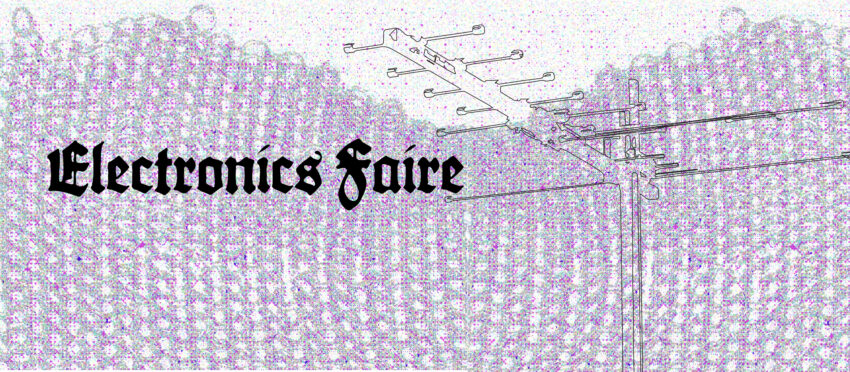Submission Information
Submit Proposals Using This Form
Deadline: 26 January 2025 11:59 PM
Event Information:
The Digital Scholars Studio at the Charles Library and the Music Technology Department at the Boyer College of Music and Dance invite submissions for organizations to table, individual or group paper presentations, workshops, performances, and artworks for the Low Tech Electronics Faire.
This Year’s Theme, Low Tech
Low Tech follows the spirit of the low fidelity (lofi), low-tech, minimal computing, handmade, craft, and DIY movements and genres. Low Tech can be a bounded technical designation (adjacent to technical prefixes like smart or super), and/or an abstracted aesthetic practice. Low Tech is not synonymous with analog: there are myriad examples of digital, low-tech networks, protocols, and objects. The prefix “low” can be applied to other technical designations including but not limited to things like low-power electronics and electronics that make use of low-level programming languages. Low Tech might be a process of looking through the history of technology to find something new in that which is old. As a methodology, a low tech essay could examine fundamental logics of circuit design and prototyping, electronic component manufacturing (from the handmade to the industrial), and counting and computation. As a practice, Low Tech could be something like weaving or drawing to explain a low-level programming concept, taking electronics apart, growing crystals at home, making ascii art, circuit bending to make music, breaking electronic parts (on purpose or on accident), salvaging electronic parts, making art with simple machines, powering electronics through something like the sun, winding a lever, or riding a bike. We welcome myriad interpretations and meditations on this theme.
Call For Proposals
Workshops
Workshop Instructors will be compensated a $350 honorarium per workshop. Each workshop will be granted a budget of up to $150 for materials. Workshop sessions must be at least an hour and a half long and can be a maximum of four hours long. To preserve the intimacy and spirit of the event and our classroom sizes, some workshops will be capped at 8 participants each and some at 15. If your workshop requires a larger group, please indicate that on your application so we know what classroom size you will need. Keep in mind that a larger group will result in the same $150 materials budget.
Lo-dB Performances (curated by Sandra James and Michelle Temple)
Do you make hand-made electronic instruments? Looking for a performance venue? Open call for performers and low-tech instrument makers to play in our Low Decibel ensemble to showcase instruments that have been made with low-tech. For example, instruments that are made using discrete electronic components such as capacitors, resistors, inductors, transistors, and non-intelligent integrated circuits. Please see the inspiration links below! Open to groups or solo artists. Performances will close out the Electronics Faire on Friday March 14th in the afternoon through the early evening on the library’s roof terrace.
Art Exhibition (curated by Ollie Goss and Hannah Tardie)
The Electronics Faire affiliated exhibition is open to artists, crafts people, and practitioners working in a variety of mediums that specifically engage with this year’s theme, Low Tech. Low tech asks us to look at what we already have in the room and if from that we can discover something new. We are interested in lofi, do-it-yourself, and handmade approaches: images created by pinhole cameras, hand painted film, flip books, net art running on an obsolete browser, solar-powered radios, mail art, analog video, hand-cranked kinetic sculpture, glitch art, and scanner art, to name a few. We seek work that asks us to move slowly and we seek work that surprises us.
Low-Tech Bibliography and Inspiration:
Minimal Computing
Low Tech Magazine
How To Get What You Want Hannah Perner-Wilson
Sizzling Semiconductors Ioana Vreme Moser
Tupperware Electronic Instruments ADACHI Tomomi
Drift Mine Satellite Everest Pipkin
No Tech Magazine
Āmantēcayōtl: And When it Disappears, it is Said, the Moon has Died, Fernando Palma Rodríguez
How to Build a Digital Brick Wall Allan Wexler
Solar Server for Video Games Kara Stone
Textile Instruments Agente Cosura / Lisa Simpson
The New Way Things Work David Macaulay
Neo-Luddite Reading Groups
Imaginary Landscape No. 4 John Cage
Vape Synth David Rios, Kari Love, Shuang Cai, and Becky Stern
Permacomputing
How to Do Things with Sensors Jennifer Gabrys
Painting Machines Lolo y Sosaku
Handmade Electronic Music Nicholas Collins
Dark Matter Objects Zine Neta Bomani
Super Mario Clouds Cory Archangel
Low Power Electronics
Case Mod by Janne Schimmel
Uncomputable Ephemera Alex Galloway
Handmade Computers Taeyoon Choi
Bread Symphony Katya Rozanova, Ashley Jane Lewis, and Max Horwich
Circuit Experiments Michelle Temple
Tiny Internet Spencer Chang
Open Garden Alice Yuan Zhang
Minimal Computing and Ontologies Erik Radio
Alt-Text as Poetry Finnegan and Bojana
Towards a Folk Computer Cristóbal Sciutto
Materiality and Matter and Stuff: What Electronic Texts Are Made Of Matthew G. Kirschenbaum
Our Networks Conference
